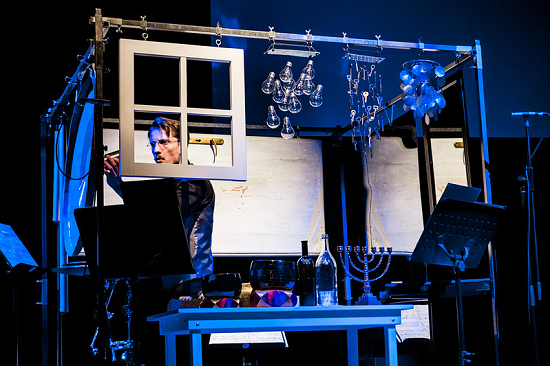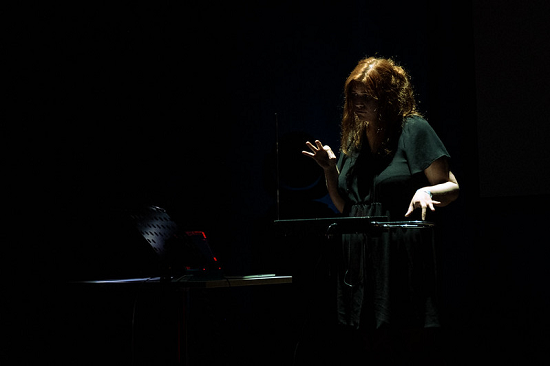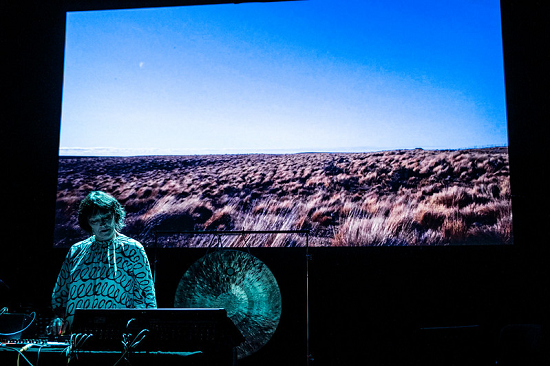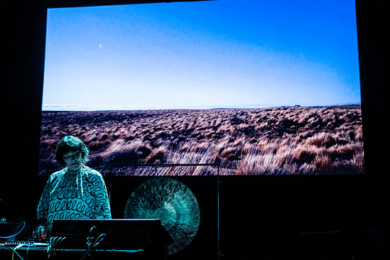Chica Paula
All year round, the cultural epicentre Radialsystem, in the heart of Berlin’s Friedrichshain quarter, hosts innovative festivals. They include the contemporary dance event Open Spaces in February and the experimental music focused CTM held in January and May, and over a hot and rainy July weekend there is Heroines Of Sound.
This distinctive and forthright festival is dedicated to female and non-binary performers of electronic music, prompting discourse that ranges from honouring historical figures to celebrating contemporary artists and composers.
Geographically rich, the festival has so far boasted artists from over 24 different countries, and only continues to grow in magnitude as it reaches out further to the wider experimental electronics community, both young and old. For lovers of sound art, classical composition, sound ecology, and more, the programme is abundant with multifaceted works.
Stretching from classical to experimental composition and electronic manipulation, with theatre and performance all intertwined, Heroines Of Sound is a series of intensely beautiful, sometimes amusing, sometimes chilling vignettes. Some of the pieces are enriched by audience participation, adding to the collective ethos and community spirit of the festival. Deeply rewarding to witness, the festival continuously succeeds in its goal to open up closed or static conversations about female voices in sound. Here are eight of the finest artists tQ caught at this year’s edition.
Sarah Nemstov

Sarah Nemstov is a German composer who completed her studies in Hanover and Berlin alongside Nigel Osborne, Johannes Schöllhorn and Walter Zimmermann. Her works explore the marriage of organic and synthetic, electronic and acoustic, bringing to the forefront the delicate set ups often at the fringes of music theatre. Nemstov’s work often focuses on Jewish Literature, and ‘En Face’, her composition for the festival, was inspired by Polish-Jewish writer Bruno Schulz’s story ‘Solitude’. In it, the lonely narrator delves into a focused madness as he describes his surroundings in a Kafkaesque rush. ‘En Face’ is performed in a sole percussion performance by Aleksander Wnuk using only his hands as the percussive force; the isolated scene brought to life surrounded by props and instruments, caged in allegory.
Chica Paula
Chica Paula is the pseudonym of Chilean DJ, musician and sound artist Paula Schopf, who has been a key figure in the Berlin artist collective Ocean Club’and the wider Chilean electronic scene for several decades and is an alumni of the prolific Sound Studies master’s course at Berlin’s Universität der Künste. Schopf has a keen ear for incorporating natural sounds from her landscape and has further explored the world of sound research and the socio-historical aspects of sound in the urban landscape, recently holding workshops for those interested in field recording. Her piece for the festival ‘Magallanes IV’, accompanied by fragmented visuals from Eduardo Velásque, is an accumulation of field recordings from a residency in Patagonia, and aims to draw attention and respect to the perspectives of its indigenous inhabitants. Melding this sound narrative with analogue synthesis, Schopf creates an often intense and continuous flow of communication.
Other Eye

Other Eye is the duo of Yiran Zhao & Kirstine Lindemann, who use their corporeal selves to reveal music outside of sound, drawn only from physical narration. The two performers’ movements are magnified through video, the central idea being to create a unique and uncomfortable confrontation with their living bodies, creating a spectacle of closeness. No sound is heard, just the composers drawing attention to their physical bodies through sporadic movements creating a space that delivers protest without the presence of sound.
Hildegard Westerkamp
Canadian composer, sound ecologist and radio artist Hildegard Westerkamp, born in 1946, is a classically trained flutist and pianist and a renowned figure in acoustic ecology – a discipline primarily concerned with the relationship between human beings and their environment. She was also a member of the research group World Soundscape Project at Simon Fraser University, an organisation which operated during the late 1960s and ‘70s, and helped her to establish the World Forum for Acoustic Ecology as a founding member. ‘Beneath the Forest Floor’ is Westerkamp’s commissioned piece, collected and constructed from the audio phenomena recorded in the forests of British Columbia in the summer of 1991. Through the forest’s natural sonics the audience is transported to a landscape of piercing stillness.
Micheline Coulombe Saint-Marcoux
A key figure in the world of French-Canadian composition, Micheline Coulombe Saint-Marcoux was a teacher at the Conservatoire de musique du Québec à Montréal, and composed works for numerous collectives such as the Montreal Symphony Orchestra and the Canadian Broadcast Corporation. She also studied electronic music at the Office de Radiofussion Paris and taught until her death at the age of 46 in 1985. Her piece ‘Arkasalatartôq’ focuses on verbal delirium.
Minimoog Performances

A portion of the festival’s curation features specially commissioned works from different composers and artists, tasked with using Minimoog synthesisers as portals to their creative vision. An electronic music professor appointed Member to Akademie der Künste in 2018, Annesely Black’s performance ‘hurry up the machine. I HAVE STRUCK A BIG BONANZA’ is inspired by reimaging the wirings of the Minimoog as Thomas Edison’s work processes. Kirstine Lindemann incorporates the body as a musical instrument in a union with the synthesizer (harmonic and otherwise) for her piece ‘Trio’. Theremin composer Dorit Chrysler combines her instrument of choice with the Minimoog’s filters, Svetlana Maraš investigates and elongates the natural tonal qualities of the synth for ‘Scherzo per oscillatori’, Misha Cvijović’s piece ‘Iktsuarpok’ employs a small, explosive orchestra of four Minimoogs in quartet formation, and Alessandra Eramo’s performance ‘The Dream Feed’ uses the instrument to reference a piece by pianist Zosha Di Castri.
Mariam Gviniashvili
Oslo-based, Georgia born Mariam Gviniashvili focuses on the role of spatiality in music, which has naturally found its way into the expansive world of the audiovisual. Exploring the interchangeability between 3D sound and music, her piece ‘Chaos and Awe’, borrowed and influenced by Mark W. Scala’s exhibition of the same name, reflects her own experience as an artist of immigrant background in terms of, in her own words ‘fear, control, survival, deception, discrimination, struggle, and survival.’ Using a combination of organic and synthetic sounds, Gviniashvili marries the audial and visual together using the same parameters for the sound and the image, creating a synthetic unity where the sound mimics the image in its own form.
RETAMA
Comprised of Pía Alvarado Arróspide, Claudia Sofía Alvarez, Naid Cruz, Yemit Ledesma & Isa Otoya and founded in the uncertain waters of June 2020, RETAMA is the very first collective of Peruvian women composers of contemporary music. So far, the collective has produced work from hundreds of artists, combining audiovisual art, contemporary dance and poetry and more. Among their works, Pía Alvarado Arróspide’s ‘Of the uncertain’ draws inspiration from three pieces of graffiti art in Berlin and Perú, Yemit Ledesma’s piece ‘Anonymous orchids’ is based on poems by Violeta Barrientos engaged in the feminine struggle, and Isa Otoya’s piece ‘Amaras’ collates feelings of introspection and collectivism initiated by the collective struggle of the pandemic.




